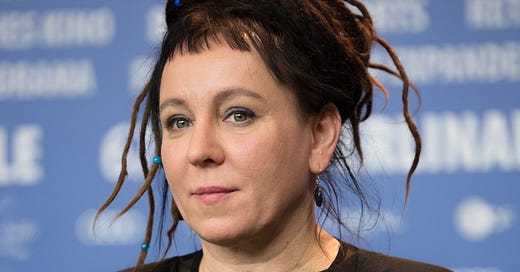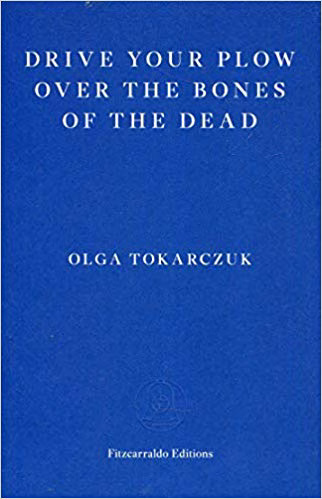Janina Duszejko lives alone in rural Poland near the Czech border. She teaches in a local school in the nearby town. She loves nature, particularly the woods where she lives, and supplements her income by maintaining nearby cabins owned by part-time summer residents.
A vegetarian and supporter of animal rights, Duszejko mourns the disappearance of her two beloved dogs. She perseveres with her studies in astrology and continues to translate with her friend Dizzy the English poet William Blake (1757 – 1827). Studying helps her to grieve. She believes it may reveal what happened to her dogs. Or, indeed, the local hunters dead in suspicious circumstances.
Duszejko is the protagonist in the novel Drive Your Plow Over the Bones of the Dead by Olga Tokarczuk (2018), winner of the Nobel Prize in Literature that year. Tokarczuk is recognised for her
narrative imagination that with encyclopaedic passion represents the crossing of boundaries as a form of life.
Novels entertain with their narrative imaginations. They engage readers with an infinite variety of human experiences. What has Duszejko’s imagined life got to do with animals and social justice?
I choose not to use, as may be expected, an acclaimed nonfiction book or a trusted textbook to explore animals and social justice. I pick a novel instead. Novels often explore themes of social justice. Think Dickens or Dostoevsky, Toni Morrison or Alice Walker.
But what of fiction about animals and social justice?
Perhaps few people would consider the plight of animals a social justice issue. But clearly both the prize-winning author, Tokarczuk, and her narrator, Duszejko, do. Drive Your Plow Over the Bones of the Dead is in the tradition of novels engaging readers with the infinite variety of human-animal experiences.
There is Black Beauty by Anna Sewell (1877), Hackenfeller's Ape by Brigid Brophy (1953), The Roots of Heaven by Romain Gary (1956), A Tiger for Malgudi by R K Narayan (1983), Elizabeth Costello by J M Coetzee (2003), who won the Nobel Prize in Literature that year, and The Animals in That Country by Laura Jean McKay (2020), winner of the Victorian Prize for Literature and Victorian Premier's Prize for Fiction in Australia.
As you can see, animals are not an alien species to questions of social justice. Justice is sought in these books as imagined in society, respectively for: horses; an imagined nonhuman primate sent into space; African elephants; a wild-caught tiger performing in a circus ring; and animals generally. Sewell and Narayan imagine the lives of animals and their stories as told by a horse and a tiger. The others are from our human perspective. I am fascinated by how novels with animal protagonists provoke our imaginations and jump-start our minds.
(But what of George Orwell’s Animal Farm (1944), you ask? I refuse to include it. It is not a book about them. It is about us.)
In Drive Your Plow Over the Bones of the Dead, Tokarczuk writes a whodunit served with an order of animal ethics. Duszejko speculates that the deer in the woods and the foxes freed from a fur farm have killed the hunters in revenge. Duszejko describes how Dizzy finds a video they watch on the Internet.
A handsome Stag attacks a hunter. We see it standing on its hind legs, striking the Man with its front hooves. The hunter falls over, but the Animal doesn’t stop, it stamps on him in a fury, it doesn’t give him a chance to crawl away on his knees.
The World Turned Upside Down is a folkloric tradition where songs and art reverse power roles from human to human and human to animal. Women serenade men and give them roses. Working-class men instruct upper-class men to do manual work. Horses sit in carriages drawn by men. And even animal to animal when sheep chase lions.
Would animals do to us what we do to them? Would they fight back? (As they do in Gene Stone’s The Awareness (2014), when all animals suddenly gain conscious awareness of human domination.) Do they resist? What if humans and animals and their place in society were reversed? Is this what is meant by animals and social justice?
In this series of guest posts, I have explained why animals matter in the climate emergency. Industrial agriculture may have provided us with cheap food in a lifetime, but we need to move away from chemical-dependent, intensive factory farming to reduce the impact of climate change.
I described the spaghetti junction of patriarchy, sexism, racism, capitalism, speciesism, and how the intersection of oppressions maintains its power and control, preventing us from establishing a caring society for all.
I argued the greatest challenge facing the animal rights movement is making the moral and legal status of animals a mainstream political issue. Going vegan and speaking out for animals are important steps for people to take. But optional lifestyle choices must be complemented with initiatives that seek institutional, political, and legal change for animals.
In short, animal rights is social justice. The animal rights movement is a social justice movement. Novelists know it. So do some advocates. Our work is to make this everyday common sense. Animals are part of society. They deserve social justice.
Not wanting to give away what happened to Duszejko’s dogs or reveal any other spoilers, I urge you to read Drive Your Plow Over the Bones of the Dead.
Read books. Change the world.
Olga Tokarczuk. Trans by Antonia Lloyd-Jones. 2019. Drive Your Plow Over the Bones of the Dead. London: Fitzcarraldo Editions.
This is the last in a series of four posts adapted from their first publication on The British Library’s Social Science blog in 2023. The British Library acquired the Kim Stallwood Archive in 2022. The four posts in this series focus on ‘Animals and Climate Change,’ ‘Animals and Feminism,’ ‘Animals and the Law,’ and ‘Animals and Social Justice.’
Please let me know which books you recommend reading about animals and social justice. Here are some to prompt you.
Aysha Akhtar, MD. 2019. Our Symphony with Animals: On Health, Empathy, and Our Shared Destinies. New York: Pegasus Books.
Marc Bekoff & Jessica Pierce. 2010. Wild Justice: The Moral Lives of Animals. Chicago: University of Chicago Press.
Josephine Donovan & Carol J Adams. (eds) 2007. The Feminist Care Tradition in Animal Ethics. New York: Columbia University Press.
Lisa Kemmerer. (ed.) 2011. Sister Species: Women, Animals, and Social Justice. Urbana: University of Illinois Press.
Josh Milburn. 2023. Food, Justice, and Animals: Feeding the World Respectfully. 2023. Oxford: Oxford University Press.






Loved that book. Very daring!
Some other vegetarian/vegan nobel laureates, apart from her and Coetzee: Maurice maeterlinck and Marguerite yourcenar. Maybe there's others.
It's an incredible novel. Thanks for your recommendation.